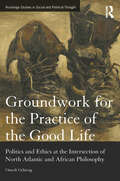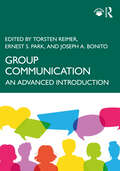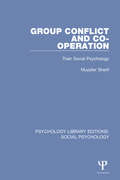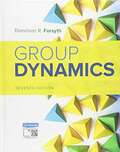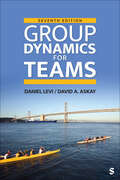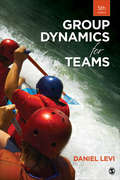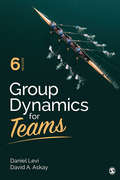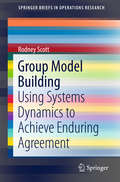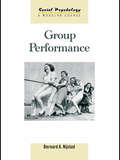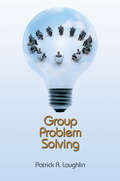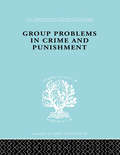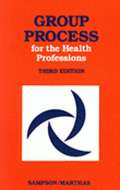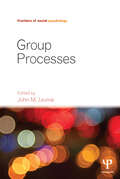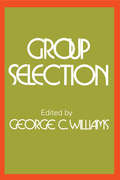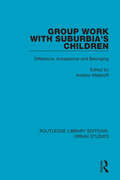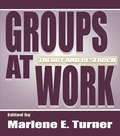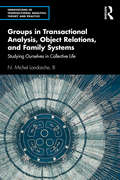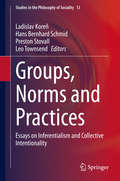- Table View
- List View
Groundwater Sustainability: Conception, Development, and Application (Palgrave Studies in Environmental Sustainability)
by Robert E. MaceThis book will provide a comprehensive discussion of groundwater sustainability, including what it is, how its definition has changed over time, why traditional assessments of it are wrong, how assessments of it are ideally multidisciplinary efforts recognizing that policy is more controlling of outcomes than science, and why achieving it is difficult once pumping exceeds sustainable levels of pumping. The book will provide a nontechnical background of hydrogeology relevant to groundwater sustainability and present several case studies from around the United States and the world. The book has been designed to appeal to academics, students, and practitioners. Academics, particularly those just getting into the subject, will find the book a useful entry in terms of management concepts and political realities of attempting to achieve groundwater sustainability. It will also be useful to academics in that the book will include discussions on the history and development of groundwater sustainability and the practical aspects of aspiring to and achieving sustainable production. Although not a textbook, the book could be used as the basis for teaching a course or as a supplement to a hydrogeology or groundwater management class. Accordingly, the book will include questions and additional reading materials at the end of each chapter. This book will also be useful to practitioners through non-technical explanations of the sciences, discussions of the nuances of defining sustainability in aquifers, and the presentation of case studies where sustainable management has failed and succeeded.
Groundwork for the Practice of the Good Life: Politics and Ethics at the Intersection of North Atlantic and African Philosophy (Routledge Studies in Social and Political Thought)
by Omedi OchiengWhat makes for good societies and good lives in a global world? In this landmark work of political and ethical philosophy, Omedi Ochieng offers a radical reassessment of a millennia-old question. He does so by offering a stringent critique of both North Atlantic and African philosophical traditions, which he argues unfold visions of the good life that are characterized by idealism, moralism, and parochialism. But rather than simply opposing these flawed visions of the good life with his own set of alternative prescriptions, Ochieng argues that it is critically important to step back and understand the stakes of the question. Those stakes, he suggests, are to be found only through a social ontology – a comprehensive and in-depth account of the political, economic, and cultural structures that mark the boundaries and limits of life in the twenty-first century. It is only in light of this social ontology that Ochieng then proffers an alternative normative account of the good society and the good life – which he spells out as emergent from ecological embeddedness; social entanglement; embodied encounter; and aesthetic engenderment. At once sweeping and rigorous, incisive and subtle, original and revisionary, this book does more than just appeal to intellectuals and scholars across the humanities and social sciences – rather, it opens up the academic disciplines to a whole new landscape of exploration into the biggest and most pressing questions animating the human experience.
Group Communication: An Advanced Introduction
by Torsten Reimer Ernest S. Park Joseph A. BonitoIn this comprehensive, advanced introduction to group communication, the field’s leading experts summarize theory, methodological advancements, and current research in the field. This book follows a coherent structure specifying clear objectives and evidence-based practical implications for the management of groups. Each chapter provides case study examples highlighting the role of communication for group functioning. The textbook takes a particular look at recent advancements in the research on virtual teams, the role of technology in group communication, and issues of diversity and inclusion, considering group communication in various situations including health and organizational contexts. It features theory-driven descriptions, an emphasis on empirical findings, and reflections on research methods. The book is an integrative and coherent textbook for advanced undergraduate and graduate group communication classes and a useful reference for students, scholars, and group communication professionals across different disciplines including communication studies, psychology, life sciences, business administration, management, and engineering. Online resources include a sample course syllabus, discussion questions, lecture slides, and a test-bank. They are available at www.routledge.com/9781032114712
Group Conflict and Co-operation: Their Social Psychology (Psychology Library Editions: Social Psychology)
by Muzafer SherifOriginally published in 1966 the author challenges the accepted theories of group conflict of the time, such as frustration and maladjustment. For him conflict and its accompanying aggressiveness are features of interaction between groups and he supports this theory with a detailed experimental study of controlled groups. At the time of publication, Dr Otto Klineberg, Director of the International Centre for Intergroup Relations at the Sorbonne wrote: ‘Social scientists everywhere owe a great debt of gratitude to Professor Sherif. The distinguished series of publications for which he and his co-workers are responsible have an honoured place in our libraries. In particular, his contributions to the field of intergroup relations are outstanding; his concept of "superordinate goals", based on a combination of theoretical insight and brilliant experimentation, has become a household word for those concerned with this significant problem. In his new volume, Group Conflict and Co-operation, he carries his analysis much further, not only describing the results of several original investigations, but also building a theoretical appraisal of an extensive research literature. The author has made still another significant contribution toward a better understanding of one of the most complex and disturbing phenomena of our time.’
Group Dynamics (Mindtap Course List Series)
by Donelson R. ForsythGROUP DYNAMICS, 7th Edition, covers all major theories and topics pertaining to group and team processes. Focus on what's most important with clearly organized chapters and highlighted key points, and see how to apply concepts to actual groups through extended case studies -- one in every chapter. <p><p>The author draws on examples from a range of disciplines including psychology, management, law, education, sociology, and political science to help you develop a deeper understanding of each topic that you'll take with you beyond the classroom.
Group Dynamics for Teams
by Daniel J. Levi David A. AskayGrounded in psychology research but with a practical focus on organizational behavior issues, Group Dynamics for Teams, Seventh Edition helps readers understand and participate in teams more effectively in day-to-day work. Best-selling authors Daniel Levi and David A. Askay thoroughly examine basic group dynamics concepts, such as goals, norms, cooperation, and communication, as well as review the main challenges that teams face, such as conflict, decision making, problem solving, creativity, and valuing diversity.
Group Dynamics for Teams
by Daniel J. Levi David A. AskayGrounded in psychology research but with a practical focus on organizational behavior issues, Group Dynamics for Teams, Seventh Edition helps readers understand and participate in teams more effectively in day-to-day work. Best-selling authors Daniel Levi and David A. Askay thoroughly examine basic group dynamics concepts, such as goals, norms, cooperation, and communication, as well as review the main challenges that teams face, such as conflict, decision making, problem solving, creativity, and valuing diversity.
Group Dynamics for Teams: Levi, Group Dynamics For Teams
by Daniel J. LeviIncorporating the latest research throughout, Daniel Levi’s Fifth Edition of Group Dynamics for Teams explains the basic psychological concepts of group dynamics, focusing on their application with teams in the workplace. Grounded in psychology research and a practical focus on organizational behavior issues, this engaging book helps readers understand and more effectively participate in teams.
Group Dynamics for Teams: Levi, Group Dynamics For Teams 3e + Cobb, Leading Project Teams
by Daniel J. LeviIncorporating the latest research throughout, Daniel Levi’s Fifth Edition of Group Dynamics for Teams explains the basic psychological concepts of group dynamics, focusing on their application with teams in the workplace. Grounded in psychology research and a practical focus on organizational behavior issues, this engaging book helps readers understand and more effectively participate in teams.
Group Dynamics for Teams: Levi, Group Dynamics For Teams 3e + Cobb, Leading Project Teams
by Daniel J. Levi Dr. David A. AskayGrounded in psychology research but with a practical focus on organizational behavior issues, Group Dynamics for Teams helps readers understand and participate in teams more effectively in day-to-day work. Best-selling author Daniel Levi and new co-author David A. Askay thoroughly examine basic group dynamics concepts, such as goals, norms, cooperation, and communication, as well as review the main challenges that teams face, such as conflict, decision making, problem solving, creativity, and valuing diversity. Throughout the book are discussions of the organizational context of teams, including the impacts of organizational culture, virtual teamwork, rewarding teams, and team building.
Group Dynamics for Teams: Levi, Group Dynamics For Teams 3e + Cobb, Leading Project Teams
by Daniel J. Levi Dr. David A. AskayGrounded in psychology research but with a practical focus on organizational behavior issues, Group Dynamics for Teams helps readers understand and participate in teams more effectively in day-to-day work. Best-selling author Daniel Levi and new co-author David A. Askay thoroughly examine basic group dynamics concepts, such as goals, norms, cooperation, and communication, as well as review the main challenges that teams face, such as conflict, decision making, problem solving, creativity, and valuing diversity. Throughout the book are discussions of the organizational context of teams, including the impacts of organizational culture, virtual teamwork, rewarding teams, and team building.
Group Identity Fabrication Theory: A Communication-ecological Account with Social-theoretical Implications
by Robin KurillaTo date, there has been no comprehensive and coherent approach to determining the communicative and precommunicative processes involved in the construction of group identities. The present study fills this gap by developing a unified theoretical foundation that can be used to capture empirical construction processes. Moreover, it contributes to the domain of group communication research. It creates a basic theoretical riverbed that provides a conceptual foundation for the conception of inter- and intra-group communication, which does not take its starting point from 'objective' categories, but from de facto socialization processes. In addition, the architecture of an innovative social theory is presented using the example of the construction of group identity, which satisfies the demands of epistemological interests in communication studies and possibly also in other disciplines.
Group Integration and Multiculturalism
by Dan PfefferWith immigration fulfilling the role of population maintenance and growth in many Western democracies, how should these countries incorporate newcomers? This book argues that states ought to promote group integration for communities that have settled through immigration. Pfeffer defines group integration as the process through which communities develop lobbies and institutions that represent the group's perspective, and help it to enter into dialogue with their receiving society. With examples from throughout Europe and North America, the justice-based argument suggests that states should facilitate group integration since it improves, among other things, the democratic participation of groups.
Group Model Building: Using Systems Dynamics to Achieve Enduring Agreement (SpringerBriefs in Operations Research)
by Rodney ScottThis book describes the cognitive and interpersonal effects of group model building, and presents empirical research on what group model building achieves and how. Further, it proposes an integrated causal mechanism for the effects on participants. There have been multiple previous attempts at explaining the effects of group model building on participants, and this book integrates these various theories for the first time.The causal mechanisms described here suggest a variety of design elements that should be included in group model building practice. For example, practitioners typically try to reduce complexity for clients, to make the process feel more accessible. In contrast, the findings presented here suggest that the very act of muddling through complexity increases participants’ affective commitment to the group and the decisions made.The book also describes implications for theory and practice. System dynamics has traditionally been interested in using technical modeling processes to make policy recommendations. Group model building demonstrates that these same techniques also have implications for group decision making as a method for negotiating agreement. The book argues for the value of group model building as a mediating or negotiating tool, rather than merely a positivist tool for technical problems.
Group Performance
by Bernard A. NijstadPeople interact and perform in group settings in all areas of life. Organizations and businesses are increasingly structuring work around groups and teams. Every day, we work in groups such as families, friendship groups, societies and sports teams, to make decisions and plans, solve problems, perform physical tasks, generate creative ideas, and more. Group Performance outlines the current state of social psychological theories and findings concerning the performance of groups. It explores the basic theories surrounding group interaction and development and investigates how groups affect their members. Bernard A. Nijstad discusses these issues in relation to the many different tasks that groups may perform, including physical tasks, idea generation and brainstorming, decision-making, problem-solving, and making judgments and estimates. Finally, the book closes with an in-depth discussion of teamwork and the context in which groups interact and perform. Offering an integrated approach, with particular emphasis on the interplay between group members, the group task, interaction processes and context, this book provides a state-of-the-art overview of social psychological theory and research. It will be highly valuable to undergraduates, graduates and researchers in social psychology, organizational behavior and business.
Group Problem Solving
by Patrick R. LaughlinExperimental research by social and cognitive psychologists has established that cooperative groups solve a wide range of problems better than individuals. Cooperative problem solving groups of scientific researchers, auditors, financial analysts, air crash investigators, and forensic art experts are increasingly important in our complex and interdependent society. This comprehensive textbook--the first of its kind in decades--presents important theories and experimental research about group problem solving. The book focuses on tasks that have demonstrably correct solutions within mathematical, logical, scientific, or verbal systems, including algebra problems, analogies, vocabulary, and logical reasoning problems. The book explores basic concepts in group problem solving, social combination models, group memory, group ability and world knowledge tasks, rule induction problems, letters-to-numbers problems, evidence for positive group-to-individual transfer, and social choice theory. The conclusion proposes ten generalizations that are supported by the theory and research on group problem solving. Group Problem Solving is an essential resource for decision-making research in social and cognitive psychology, but also extremely relevant to multidisciplinary and multicultural problem-solving teams in organizational behavior, business administration, management, and behavioral economics.
Group Problems in Crime and Punishment (International Library of Sociology #No. 117)
by Hermann MannheimFirst published in 1998. Routledge is an imprint of Taylor & Francis, an informa company.
Group Process for Health Professions
by Edward E. Sampson Marya MarthasPresenting a well-balanced blend of theory and practice, this exciting book helps the health care professional develop the skills needed to work effectively in small groups. In clear, concise language, the text introduces the fundamental theories, concepts, issues, and approaches needed for individuals to work successfully in groups.
Group Processes (Frontiers of Social Psychology)
by John M. LevineIt is impossible to understand human behavior without understanding the critical role that groups play in people’s lives. Most of us belong to a range of formal and informal groups, including families, work teams, and friendship cliques. These groups absorb a great deal of our time and energy and are instrumental in satisfying our most fundamental needs. In addition, they connect us to larger social aggregates (e.g., political parties, business organizations, religious denominations) that influence our lives in important ways. This volume provides a comprehensive overview of classic and contemporary issues in the field of group processes. Chapters are written by internationally known experts who have made major theoretical and empirical contributions to the study of groups. The broad and up-to-date coverage of the book makes it an essential resource for advanced undergraduates, graduate students, researchers, and practitioners. The volume will be of interest to scholars in various disciplines, including social and organizational psychology, sociology, communication, economics, and political science.
Group Selection (Controversy Ser.)
by George C. WilliamsLiving things are constantly engaged in a struggle for existence, and ingenious devices for the purpose of self-preservation can be seen in all types of animal and plant life. However, nature also displays phenomena that are not related to survival or that seem clearly to violate the principle of self-preservation - particularly when organisms interact with one another. Darwin investigated these apparent contradictions and proposed that both mechanisms of self preservation and those of reproduction are explained by a more basic principle of "natural selection" - the reproductive survival of the fittest. George C. Williams in "Group Selection" challenges the adequacy of this process of selection at the individual level.Williams has here collected the work of the chief partisans with opposed viewpoints on the theory of selection at the group level to state their arguments and rebuttals. A minority of modern biologists offer evidence to show that groups of living things are organized to assure their collective survival; they are not merely collections of individuals designed for their own survival and reproduction. In opposition, defenders of the traditional point of view charge that mechanisms of group survival are based on illusion and misinterpretation.Because of the wide range of opinion expressed in "Group Selection", the reader is exposed to all sides of the dispute and encouraged to form his or her own views. In addition, as a source book on current evolutionary issues or for research or reference material, "Group Selection" remains a valuable addition to every personal and institutional library in the biological sciences.
Group Technology And Cellular
by Ali K. KamraniThis book provides the latest up-to-date documentation on the scope of research in Group Technology (GT) and Cellular Manufacturing (CM). It is a comprehensive listing of the methodologies, techniques, algorithms and tools used for practical implementation of the concepts of GT and CM.
Group Work with Suburbia's Children: Difference, Acceptance, and Belonging (Routledge Library Editions: Urban Studies #18)
by Andrew MalekoffThis collection of articles, first published in 1991, attempts to describe life in the suburbs from diverse vantage points, to evoke a feeling of what life is like for some of the children and their families living in these communities and to demonstrate the practice and value of group work within this context. This title will be of interest to students of social work, sociology and urban studies.
Groups at Work: Theory and Research (Applied Social Research Series)
by Marlene E. TurnerThis book has two purposes. First, it is fundamentally about groups at work, both as they attempt to accomplish their goals and as they operate in organizational settings. Second, it draws together group researchers from social psychological and organizational studies. Each chapter focuses on a central issue regarding groups as they work and examines that issue by drawing from both social psychological and organizational research. Thus, this book centers on the convergence and divergence of these two fields.
Groups in Transactional Analysis, Object Relations, and Family Systems: Studying Ourselves in Collective Life (Innovations in Transactional Analysis: Theory and Practice)
by N. Michel Landaiche, IIIGroups are arguably an essential and unavoidable part of our human lives—whether we are part of families, work teams, therapy groups, organizational systems, social clubs, or larger communities. In Groups in Transactional Analysis, Object Relations, and Family Systems: Studying Ourselves in Collective Life, N. Michel Landaiche, III addresses the intense feelings and unexamined beliefs that exist in relation to groups, and explores how to enhance learning, development and growth within them. Landaiche’s multidisciplinary perspective is grounded in the traditions of Eric Berne’s transactional analysis, Wilfred Bion’s group-as-a-whole model, and Murray Bowen’s family systems theory. The book presents a practice of studying ourselves in collective life that utilizes a naturalistic method of observation, analysis of experiential data, and hypothesis formation, all of which are subject to further revision as we gather more data from our lived experiences. Drawing from his extensive professional experience of group work in a range of contexts, Landaiche deftly explores topics including group culture, social pain, learning and language, and presents key principles which enhance and facilitate learning in groups. With a style that is both deeply personal and theoretically grounded in a diverse range of studies, Groups in Transactional Analysis, Object Relations, and Family Systems presents a contemporary assessment of how we operate collectively, and how modern life has changed our outlook. It will be essential reading for transactional analysts in practice and in training, as well as other professionals working with groups. It will also be of value to academics and students of psychology, psychotherapy, and group dynamics, and anyone seeking to understand their role within a group.
Groups, Norms and Practices: Essays on Inferentialism and Collective Intentionality (Studies in the Philosophy of Sociality #13)
by Hans Bernhard Schmid Ladislav Koreň Preston Stovall Leo TownsendThis edited volume examines the relationship between collective intentionality and inferential theories of meaning. The book consists of three main sections. The first part contains essays demonstrating how researchers working on inferentialism and collective intentionality can learn from one another. The essays in the second part examine the dimensions along which philosophical and empirical research on human reasoning and collective intentionality can benefit from more cross-pollination. The final part consists of essays that offer a closer examination of themes from inferentialism and collective intentionality that arise in the work of Wilfrid Sellars. Groups, Norms and Practices provides a template for continuing an interdisciplinary program in philosophy and the sciences that aims to deepen our understanding of human rationality, language use, and sociality.

